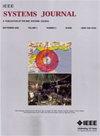动态网络分布加权k路径顶点覆盖的贝叶斯博弈
IF 4.4
3区 计算机科学
Q1 COMPUTER SCIENCE, INFORMATION SYSTEMS
引用次数: 0
摘要
加权$k$路径顶点覆盖(WVCP$_{k}$)问题是现实世界复杂系统中具有许多实例的动态网络覆盖问题的一个主要分支。分布式系统中网络覆盖优化的一个关键挑战是为自主决策代理设计分散的方案。本文主要关注WVCP$_{k}$问题的分布式优化,其中单个顶点作为理性代理,基于不完全信息独立做出决策。我们建立了一个贝叶斯博弈模型来捕捉agent之间的相互作用,agent面对其$k$路径邻居状态的不确定性,并依靠通信来增强他们对实际覆盖状态的个人信念。我们的分析深入到贝叶斯纳什均衡和前后帕累托最优覆盖状态(POCS)在这个框架内。此外,开发了一种基于贝叶斯博弈的扰动并行算法(BGPPA),并证明即使智能体仅限于使用估计的期望效用,该算法也收敛于事后POCS集。一系列的数值模拟表明,BGPPA具有优异的性能,可以快速收敛于各种网络。本文章由计算机程序翻译,如有差异,请以英文原文为准。
Bayesian Game for Distributed Weighted K-Path Vertex Cover of Dynamic Networks
The weighted $k$ $_{k}$ $_{k}$ $k$
求助全文
通过发布文献求助,成功后即可免费获取论文全文。
去求助
来源期刊

IEEE Systems Journal
工程技术-电信学
CiteScore
9.80
自引率
6.80%
发文量
572
审稿时长
4.9 months
期刊介绍:
This publication provides a systems-level, focused forum for application-oriented manuscripts that address complex systems and system-of-systems of national and global significance. It intends to encourage and facilitate cooperation and interaction among IEEE Societies with systems-level and systems engineering interest, and to attract non-IEEE contributors and readers from around the globe. Our IEEE Systems Council job is to address issues in new ways that are not solvable in the domains of the existing IEEE or other societies or global organizations. These problems do not fit within traditional hierarchical boundaries. For example, disaster response such as that triggered by Hurricane Katrina, tsunamis, or current volcanic eruptions is not solvable by pure engineering solutions. We need to think about changing and enlarging the paradigm to include systems issues.
 求助内容:
求助内容: 应助结果提醒方式:
应助结果提醒方式:


